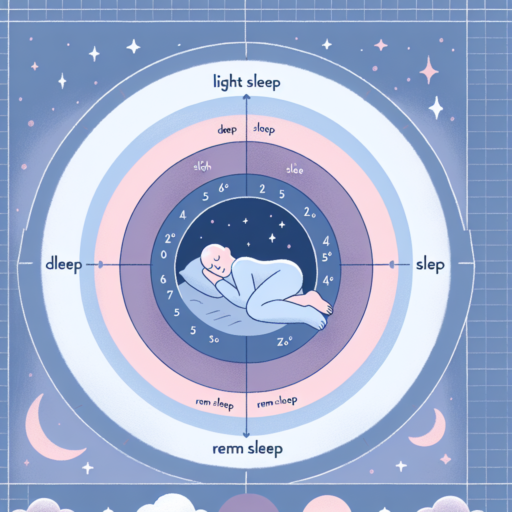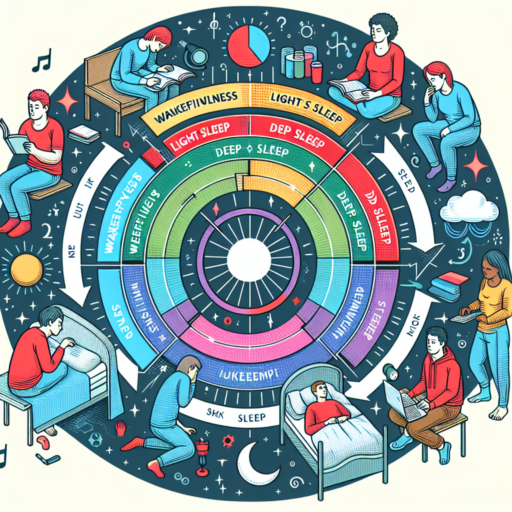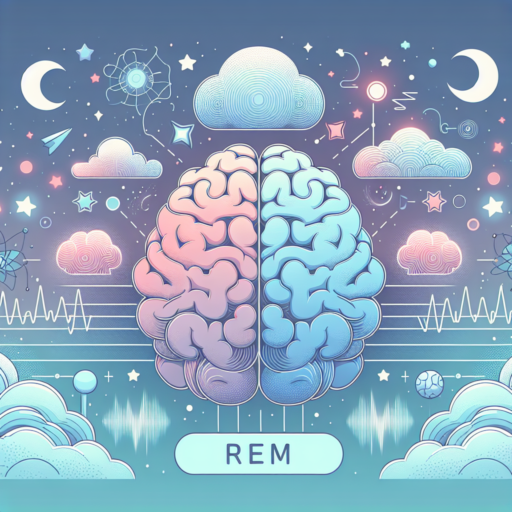What Are Sleep Cycles?
Understanding the structure of our sleep involves diving into the concept of sleep cycles. A sleep cycle refers to the patterns of brain waves and physiological changes that occur while we sleep. Recognized as an essential component of healthy rest, each sleep cycle consists of several stages, including both non-REM (Rapid Eye Movement) and REM phases. These cycles play a crucial role in how refreshed and alert we feel upon waking.
The first part of a sleep cycle is characterized by light sleep, where one can be easily awakened. This is followed by deep sleep, a stage crucial for physical recovery and growth hormone release. Finally, the cycle reaches the REM stage, where brain activity increases and vivid dreams occur. An average cycle lasts about 90 to 110 minutes, with a healthy adult experiencing four to six cycles per night. It’s the balance and uninterrupted progression through these cycles that contribute to restorative sleep.
Disturbances in sleep cycles can lead to feelings of fatigue and can impair cognitive function. Factors such as stress, electronic device use before bedtime, and irregular sleep schedules can disrupt the natural flow of sleep cycles. Recognizing the importance of these cycles encourages better sleep hygiene practices. Making adjustments to bedtime routines, ensuring a comfortable sleeping environment, and prioritizing sleep can enhance the quality and efficiency of these cycles, leading to better overall health and well-being.
The Importance of Understanding Your Sleep Cycles
Understanding your sleep cycles is crucial for optimizing your overall well-being and health. The human body goes through various stages of sleep, each serving distinct functions for our physical and mental restoration. Recognizing the patterns and phases of your sleep can significantly impact how you feel during your waking hours, from improving concentration and mood to bolstering your immune system.
Each sleep cycle comprises different stages, ranging from light sleep to deep sleep and finally, the REM (Rapid Eye Movement) stage. The quality of your sleep is determined not just by the quantity but by the seamless progression through these stages. This is where the significance of understanding your sleep cycles comes into sharp focus. It enables you to make informed decisions about your lifestyle and bedtime routines that facilitate a smoother transition through these critical stages.
Benefits of Recognizing Your Sleep Cycles
- Enhanced Cognitive Function: A good night’s sleep strengthens neural connections, making learning and memory more efficient.
- Improved Emotional Well-being: Sleep directly influences your emotional and mental health, reducing the risk of mood swings, anxiety, and depression.
- Better Physical Health: Adequate progression through sleep cycles aids in the repair of the heart and blood vessels, muscle growth, and maintaining a balanced hormone level.
How Many Sleep Cycles Do You Need Each Night?
Understanding the importance of sleep cycles is crucial for achieving restorative sleep that leaves you feeling refreshed and alert. A typical sleep cycle lasts about 90 minutes, and during this time, your body progresses through different stages of sleep, from light sleep to deep sleep and REM sleep. But, how many of these cycles do you need each night to wake up feeling rejuvenated?
The Optimal Number of Sleep Cycles
Most experts recommend that adults aim for about 5 to 6 sleep cycles per night. This translates to approximately 7.5 to 9 hours of sleep daily. However, it’s essential to remember that the quality of these cycles is just as important as the quantity. Ensuring that you’re not disrupted during the deep sleep stages is critical for the body to perform necessary repairs and for the mind to consolidate memories.
Factors Influencing Individual Sleep Needs
It’s important to note that the recommended number of cycles can vary significantly from person to person. Factors such as age, lifestyle, and overall health can influence how many sleep cycles are necessary. For example, children and teenagers need more sleep — about 4 to 5 cycles of REM sleep due to the demands of growth and brain development. Adults, especially those over 65, might require fewer sleep cycles or find their sleep patterns changing, often experiencing more fragmented sleep.
To determine the optimal number of sleep cycles for you, it’s vital to listen to your body and consider any underlying health conditions or lifestyle factors that might affect your sleep. Keeping a sleep diary or using a sleep tracker can help you understand your sleep patterns and adjust your sleep habits accordingly. Remember, achieving the right balance of sleep cycles each night is key to waking up feeling well-rested and ready to tackle the day.
The Stages of a Sleep Cycle: A Detailed Overview
Understanding the intricate stages of a sleep cycle is essential for grasping how rest impacts our overall health and well-being. A typical sleep cycle includes several stages, each playing a crucial role in restorative processes. These cycles are repeated multiple times throughout the night, transitioning between Non-Rapid Eye Movement (NREM) and Rapid Eye Movement (REM) sleep.
NREM Sleep: The Foundation of Rest
The NREM phase constitutes the majority of our sleeping period and is divided into three stages:
- Stage 1: This is the lightest phase of sleep, acting as the transition from wakefulness to sleep. It typically lasts for 5-10 minutes.
- Stage 2: During this phase, our bodies prepare for deep sleep by lowering the heart rate and body temperature. This stage lasts approximately 20 minutes.
- Stage 3: Known as the deep sleep stage, this phase is crucial for physical recovery, immune system strengthening, and energy restoration. It’s harder to wake someone from this stage of sleep.
REM Sleep: The Dream Phase
Following NREM sleep, the REM phase kicks in, typically about 90 minutes after falling asleep. This stage is well-known for being the period where most dreaming occurs. During REM sleep, the brain is highly active, almost to the same level as when awake, and this stage is vital for cognitive functions such as memory consolidation and problem-solving. Interestingly, the muscles are temporarily paralyzed during REM sleep, possibly to prevent us from acting out our dreams.
Factors That Affect Your Sleep Cycles
Understanding the various factors that affect your sleep cycles is essential for improving your overall health and well-being. Sleep is a complex process influenced by numerous external and internal factors. By recognizing these aspects, individuals can take proactive steps towards achieving better sleep quality and duration.
Environment and Comfort
One significant factor that impacts your sleep cycles is your sleeping environment and the comfort level of your sleeping area. Elements such as temperature, noise, and light can substantially disrupt your natural sleep patterns. For instance, a room that is too warm or too cold can prevent you from falling asleep or cause frequent awakenings. Similarly, loud noises and bright lights can interfere with your body’s ability to enter deeper stages of sleep. Ensuring a quiet, dark, and comfortable sleeping environment can help in optimizing your sleep cycles.
Diet and Lifestyle Choices
Your diet and lifestyle choices also play a crucial role in affecting your sleep cycles. Consuming caffeine or heavy meals right before bedtime can hinder your body’s natural sleep process. Likewise, engaging in stimulating activities or screen time can increase alertness, making it harder to wind down. Incorporating habits that promote relaxation, such as reading or meditating before bed, can significantly enhance your sleep quality.
Stress and Mental Well-being
Finally, stress and overall mental well-being are powerful factors that influence sleep cycles. High levels of stress and anxiety can lead to difficulties in both falling asleep and staying asleep. It is important to address any underlying psychological issues and implement stress-reduction techniques to improve sleep efficiency. Practices such as yoga, deep breathing exercises, and maintaining a positive bedtime routine can aid in mitigating the impact of stress on sleep.
No se han encontrado productos.
How to Track and Improve Your Sleep Cycles for Better Rest
Improving your quality of sleep begins with understanding the various cycles you go through each night. Tracking these cycles can shed light on how well you’re resting and help identify any disturbances that could be impacting your sleep quality. Modern technology, such as wearable devices and smartphone apps, has made it easier than ever to monitor your sleep patterns without needing to visit a sleep clinic.
Identifying Patterns with Sleep Trackers
Using sleep trackers, whether through a wearable device or app, can provide a comprehensive view of your nightly rest. These tools not only monitor the duration of your sleep but also the quality by analyzing the time spent in each sleep stage. With this information, you can pinpoint patterns or irregularities in your sleep cycles, such choosing as inadequate restorative deep sleep or excessive light sleep, which could suggest disturbances or lifestyle factors needing adjustment.
Improving Sleep Quality through Lifestyle Changes
Understanding your sleep cycles is the first step, but implementing lifestyle changes is crucial for enhancing sleep quality. Simple adjustments like establishing a consistent bedtime, reducing blue light exposure before sleep, and optimizing your sleep environment can yield significant improvements. These changes not only help in falling asleep more quickly but also in achieving deeper, more restorative sleep cycles—a key component for feeling refreshed and rejuvenated in the morning.
The Impact of Sleep Cycles on Your Health and Well-being
Understanding the role of sleep cycles in maintaining health and well-being is crucial in today’s fast-paced world. A typical sleep cycle involves various stages, including REM (Rapid Eye Movement) and non-REM stages, each playing a significant role in different bodily functions and mental health. These cycles impact everything from cognitive abilities to emotional stability, highlighting the intricate relationship between sleep and overall health.
Physiological Restoration is one of the most critical functions of sleep cycles. During the deeper stages of non-REM sleep, your body undergoes significant restoration. Cell repair, muscle growth, and tissue renewal are all processes that are optimized during this phase, facilitating physical recovery and boosting immune function. Neglecting sleep quality and duration can hinder these essential processes, undermining physical health and resilience.
Emotional and Cognitive Effects of sleep cycles manifest prominently in daily life. Adequate progression through sleep stages is foundational for cognitive processes such as memory consolidation, learning, and decision-making. Moreover, sleep profoundly impacts mood regulation and emotional health. Disruptions in sleep cycles can lead to increased stress, anxiety, and susceptibility to mood disorders, showcasing the deep interconnection between sleep, brain function, and emotional well-being.
Common Sleep Cycle Disorders and How to Recognize Them
Understanding and recognizing common sleep cycle disorders is crucial in taking steps toward achieving better sleep health. These disorders can significantly impact one’s quality of life, leading to fatigue, mood changes, and other health complications if left unaddressed.
Insomnia
Insomnia, characterized by difficulty falling asleep or staying asleep, is one of the most well-known sleep disorders. Signs of insomnia include spending more than 30 minutes trying to fall asleep, waking up frequently during the night, and feeling unrefreshed upon waking in the morning.
Sleep Apnea
Sleep apnea is a serious disorder where breathing repeatedly stops and starts during sleep. Common indicators include loud snoring, episodes of breathing cessation witnessed by another person, abrupt awakenings with a choking or gasping sensation, and excessive daytime sleepiness despite spending adequate time in bed.
Restless Legs Syndrome (RLS)
Restless Legs Syndrome (RLS) is a sleep disorder that causes an uncontrollable urge to move the legs, often due to uncomfortable sensations. These sensations typically occur in the evenings or during periods of inactivity, making it difficult to fall asleep or stay asleep. Recognizing RLS involves noting these urges to move, especially if they are accompanied by a temporary relief of discomfort with movement.
Tips for Syncing Your Sleep Cycle with Your Natural Body Clock
Aligning your sleep cycle with your natural body clock, or circadian rhythm, is essential for maintaining optimal health and well-being. Our body clock regulates when we feel awake and sleepy over a 24-hour period, and syncing our sleep schedule with it can lead to more restorative sleep and increased daytime energy. Here are practical tips to help harmonize your sleep patterns.
Exposure to Natural Light
One of the most effective ways to regulate your sleep cycle is to get plenty of natural light during the day. Exposure to sunlight helps to reset our body’s internal clock, signaling when it’s time to wake up and stay alert. For those who spend a lot of time indoors, taking a break to walk outside or positioning your workspace near a window can be particularly beneficial. Additionally, reducing exposure to bright lights in the evening can help cue your body for sleep.
Establish a Consistent Sleep Routine
Adherence to a consistent sleep schedule is paramount for syncing your sleep cycle with your natural body clock. Endeavor to go to bed and wake up at the same time every day, even on weekends and holidays. This consistency reinforces your body’s sleep-wake cycle and can improve the quality of your sleep. Ideally, aim for seven to nine hours of good quality sleep per night, as recommended by health experts.
Mind Your Diet and Exercise
What you eat and how much you exercise can also impact your sleep cycle. Avoid heavy or large meals, caffeine, and alcohol before bedtime, as they can disrupt sleep. Instead, choose light snacks if needed. Regular physical activity can promote better sleep, helping you fall asleep faster and enjoy deeper sleep. However, try not to exercise too close to bedtime, as this can leave you feeling energized and make it harder to fall asleep.
Latest Research and Developments in Understanding Sleep Cycles
The understanding of sleep cycles has advanced significantly in recent years, thanks to groundbreaking research and technological innovations. Scientists and sleep specialists have been able to delve deeper than ever before into how sleep cycles work, their importance for health, and methods to optimize them for a better quality of life.
One of the pivotal areas of study has been the exploration of the stages of sleep, including REM (Rapid Eye Movement) and non-REM phases. Recent studies have shed light on how these stages impact cognitive functions, emotional health, and physical wellness. Furthermore, advancements in wearable technology have made it possible for individuals to track their sleep patterns more accurately, leading to personalized sleep optimization strategies.
Trends in Personalized Sleep Analysis
Leading the way in current research is the development of sophisticated algorithms that analyze sleep data collected from wearable devices. These algorithms not only provide a detailed breakdown of sleep phases but also offer tailored recommendations for improving sleep quality. This personalized approach has shown promise in treating sleep disorders and enhancing overall well-being.
Moreover, another exciting development is the investigation into the genetics of sleep. Understanding the genetic factors that influence sleep patterns and cycles could lead to breakthroughs in personalized medicine and targeted treatments for sleep-related issues. This research is still in its early stages but represents a fascinating direction for future studies on sleep cycles.




